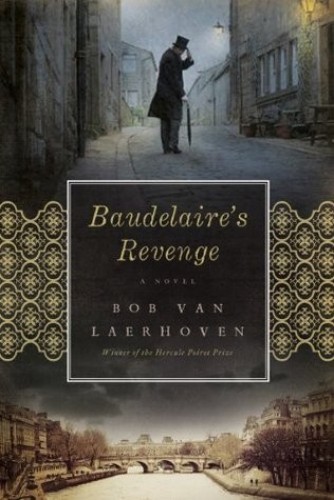
Baudelaire's Revenge
- اطلاعات
- نقد و بررسی
- دیدگاه کاربران
نقد و بررسی

February 10, 2014
Flemish author van Laerhoven makes his U.S. debut with this intense historical crime thriller, winner of the Hercule Poirot Prize in 2007. As 1870 Paris suffers hunger, angry mobs, and Prussian shelling, melancholic police commissioner Paul Lefèvre stumbles upon a murder victim in a brothel. Written on a piece of paper near the body are verses from Les Fleurs du Mal by Charles Baudelaire, who died in 1867. As new corpses appear, Lefèvre and his assistant realize that all the victims once opposed Baudelaire in some way—and that the menacing stanzas accompanying each body are in the poet’s own handwriting. Is an ardent supporter taking revenge, or is Baudelaire’s ghost afoot? Though the journals of an androgynous confidence trickster, who claims a twisted bond with the poet, offer clues, both policemen find their lives imperiled before the truth emerges. Overabundant philosophical exchanges slow the pace, and the explicit pain and perversity will disturb some readers. Still, the intricate plot, menacing atmosphere, and rich evocations of period Paris have undeniable power. Agent: William Clark, William Clark Associates.

April 1, 2014
As the Second Empire wanes, a series of murders baffles a dissolute Parisian police commissioner and his long-suffering factotum. Van Laerhoven packs much complexity into 256 pages, giving this historical mystery the heft of a far longer work--but not the coherence. In 1870, Napoleon III is losing the Franco-Prussian war, Paris is under siege, and aristocrats are girding themselves for yet another revolution. Amid the chaos, police commissioner Paul Lefevre, whose police work is often derailed by his unbridled lust for courtesans and cocottes, and his dour assistant, Bernard Bouveroux, who still chastely mourns his long-dead wife, are puzzling over a series of grisly murders that have a common element: All the corpses are found with scraps of Charles Baudelaire's verse. Although the notorious author of Les Fleurs du Mal died in 1867, the poetry appears to be in his handwriting. As the investigation continues, the narration fragments as other characters add their voices to the puzzle. The diminutive Simone Bourbier, aka Poupeye, a charlatan and sometime clairvoyant, lures Lefevre to her lair with promises of an orgy, from which he emerges dazed and addled as Simone, along with Claire de la Lune, Lefevre's favorite lady of the night, vanishes. Simone's diary reveals that she is actually Baudelaire's twin sister, born with a deformity that caused the twins' mother to consign her to a convent. Simone confesses her incestuous affair with Charles, which resulted both in her infection with syphilis and the birth of her daughter--Claire de la Lune. As the revelations pile up--the twins' guilt-ridden mother makes an appearance, as do scenes from Lefevre's and Bouveroux's military service in Algeria and episodes from Lefevre's tormented childhood--the whodunit aspect quickly becomes secondary, since one of the many characters is the obvious culprit. Instead, the book's main preoccupation is the conclusive demonstration that everyone is guilty of something--the only mystery is, to what degree? The flowers of evil, sketched in lurid botanical detail.
COPYRIGHT(2014) Kirkus Reviews, ALL RIGHTS RESERVED.

March 1, 2014
It's 1870 and the Prussians are massing along the French border. The poor are starving in Paris and revolutionaries are stockpiling arms. And a few men die in the most exotic ways--strange poisons, mutilations. Placed on each body is a verse from Charles Baudelaire's Les Fleurs du Mal apparently written in the deceased poet's hand. Trying to bury a savage tragedy of his own, Police Commissioner Lefevre investigates. Published for the first time in English, this roman policier isn't so much a straight detective story (although there are two detectives in it) as an evocation of a mind-set that now seems extravagant: the 19th-century poet's fascination with sex and death. It's no wonder this title won the Hercule Poirot Prize: the author is Belgian, as is the prize, and the twisted plot is as complicated as Agatha Christie's most convoluted mystery. VERDICT Mystery aficionados will love this pastiche of Wilkie Collins and Edgar Allan Poe but may have to suspend their skepticism while reading it.--David Keymer, Modesto, CA
Copyright 2014 Library Journal, LLC Used with permission.

April 15, 2014
Paris police commissioner Paul Lef'vre, robust and hirsute, hardly seems like a poetry lover. Nonetheless, he instantly recognizes the messages accompanying murder victims killed in flamboyant ways as excerpts from poems by the scandalous, recently deceased poet Baudelaire. Is this gruesomely inventive serial killer exacting revenge on Baudelaire's enemies? Paris is in an uproar in 1870. The Franco-Prussian War is on full boil, the poor are hungry and insurrectional, and the decadent rich are partying. As Lef'vre and longtime comrade Inspector Bernard Bouverouxthey served together as soldiers in Algiersseek to stop this diabolical, perhaps otherwordly serial killer, the philosophical Lef'vre is haunted by traumatic memories of war and a childhood abomination. He is also longing for his sharp-witted beloved, the now-missing prostitute Claire de la Lune. In this superbly crafted Hercule Poirot Prizewinning mystery, Dutch writer Van Laerhoven vividly and astutely evokes a city under siege and keenly portrays the complex and controversial Baudelaire. But he also constructs a wildly convoluted and sexually explicit gothic tale of monstrous urges and violently broken taboos.(Reprinted with permission of Booklist, copyright 2014, American Library Association.)




دیدگاه کاربران